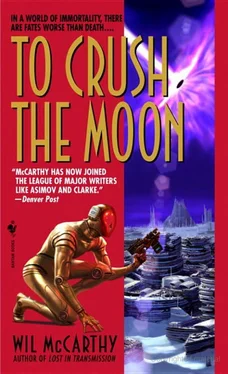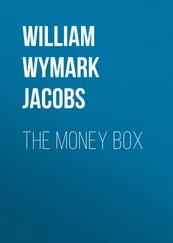“I’m a trouble magnet,” Mursk said at one point. The admission seemed to sadden him, which only heightened his aura of thoroughness and thoughtfulness. If he had a single great fault, it was a kind of self-doubt that bordered on self-loathing. To hear him tell it, he’d done little good in his life. Still, Bechs sensed through these deep layers of modesty and guilt that nearly every calamity had involved his attempting to, often against terrible odds.
“Our departure helped collapse the Barnardean economy,” he would say. Or, “I shortened the Children’s Revolt through an act of blatant treachery.” Or, “I never convinced the government to soften its punitive measures, and in terrorizing the miners into ending their rebellion I gave my de facto approval to their indenture.”
But from these statements Bechs extracted the unspoken corollaries: I’ve risked my life to preserve innocents. I know when to cut my losses. I know how to broker a deal. I am unspeakably interesting. Bechs could have questioned this man for days, for months ; but as fate would have it, the two had only been talking for twenty or thirty minutes when a commotion rose up outside. Not the buzz of reportant cameras but the actual shouting of live human beings, transmitted through the paper-thin, almost tentlike wellstone of the dormitory shelter.
“Excuse me,” Mursk said, a look of worry blooming on his face. He rose from his chair and moved to the wall, murmuring “Window” to it just as though he’d been in civilization all his life. And when the window appeared, he said, “Oh, brother.”
Conrad had been expecting trouble since before he’d even arrived here, and he’d spent much of his time huddled at a library in the apartment’s wall, learning what he could about Fatalist tactics. But what he saw outside was a surprise nonetheless. There was an attack of sorts under way, but the invaders coming down the staircase were not gray-skinned Fatalist ghouls or skeletal Death avatars, but ordinary men in blood-colored jumpsuits trimmed with white.
Conrad had spent time in four different Barnardean services, and had a fine eye for uniforms. These were neither military nor medical; they looked more like a mechanic’s coverall than anything else. They had names stenciled in black across the left breast, but no indications of rank or functional specialty. Indeed, the only insignia was a white rectangle on each man’s left sleeve, bearing a blood-red circle surrounded by five outward-facing triangles. A sunburst, highly stylized.
Conrad counted twenty men, two of them with bullhorns and all of them carrying objects he recognized immediately: contact tazzers, capable of dropping any human being in his or her tracks with the merest brush of their business end. The tazzer was a humane weapon as such things went, but the people who’d actually been struck by one—Conrad included—tended to give them a wide berth. In the words of the poet Rodenbeck, “Being tazzed is like being stepped on by an electric elephant.”
The other surprise was that the half-dressed kids at the bottom of the stairs—nearly a hundred of them—were holding their ground rather than falling back or scattering.
“What’s happening?” Bechs asked, buzzing up beside Conrad for a look.
“It’s the Red Sun eviction team,” Conrad answered. Then, in a much louder voice: “Feck! Xmary!”
He stepped out onto the balcony, prepared to vault over its railing as Xmary had done, or at least call down advice to the children and warnings to the Red Sun security. But the surprises just kept on coming.
“We are not taking names,” said one of the bullhorn carriers in an amplified but outwardly reasonable tone. “No one here will be punished. We simply request that you vacate these premises so they can be put to humanitarian use.”
But the kids—boys and girls alike—were forming up into battle lines as though they’d been training for it all their lives. Their wellgold necklaces and earrings flashed and flickered in the sunlight, not merely reflecting but in some way modulating the glare. Passing notes in class, oh my, in their own secret language. Did they feel it as taps upon their skin? As nerve inductions? As sights or sounds?
They couldn’t change their bodies, but clearly they could use their brains. And whatever they were passing, whatever they were saying to each other, the Red Sun workers seemed oblivious to it until it was too late, and their fate was sealed. When the mob had self-assembled into five clean ranks, they rushed their attackers. Silently at first, as rows one and two launched into motion, but then rows three and four let out an ululating yell, while row five raised its fists in defiance.
Nor were these kids afraid to absorb some hurt; the first two rows were sacrificial, simply throwing themselves against the Red Sun line—in some cases right up against the tazzers. This put the Red Sun workers off balance—literally—so that the third and fourth lines could sweep them off their feet, wrenching the tazzers from their hands. This was also sacrificial, as most of the kids involved went down twitching and grunting. But the fifth line swept over them without opposition, taking up the tazzers and hurling them away, without even bothering to use them against their owners.
Instead, the Red Sun people were hauled up by their armpits and threaded into cunning arm- and neck- and headlocks that made optimum use of the strengths and weaknesses of human anatomy. The guards, like everyone else, must be terribly hard to injure, but against overpowering leverage they had little recourse.
“Here now!” one of them said.
“This activity’s unlawful,” tried another.
But more kids were streaming into the area, and the ones already here were finding their voices. “We’re not hurting anything! Why are you on us like this? Leave us the hell alone!” And then, in a rising chorus: “Into the drink with you! Swim for it! Swim for it! Swim for it!! ”
“Excuse me,” said the camera of Bernhart Bechs, buzzing down for a closer view.
Conrad didn’t know what to feel. Barely fifteen seconds after the first commotion, the kids were dragging their captives toward the platform’s edge, at the juncture between two of its flower petals, and they really were going to throw them in the water.
“Stop!” he shouted after them. “There are… there… shit. There are smarter ways!”
But nobody was paying attention to an old man’s babbling, and if he jumped down there to intervene, in all likelihood he’d just be going for a swim himself. Damn! Whatever faults these kids might have, helplessness was clearly not among them. And Conrad had seen this all before, had lived it all more than once—the anger, the spontaneous order and chaos, the pent-up need for action. Alas, Utopia, Rodenbeck had written in the wake of the Children’s Revolt, thou retreatest from immorbid grasp as a cricket from fractious children.
And yea, verily, Conrad could feel it in his bones: the dream of a better life never ended, even when all sense said it should. And so the Queendom of Sol—forged with the loftiest of intentions by the best minds in history—was poised, once again, at the brink of revolution.
“Eternal life,” Conrad observed though no one was there to hear him, “is a tuberail car that won’t stop crashing.”
Chapter Eight
In which old haunts are revisited
Perhaps Conrad should have stayed. Perhaps he should have brought his negotiating skills to bear, and brokered some sort of agreement between the squatters, the platform’s rightful owners, and the Constabulary who’d come pouring out of the fax gates a few minutes after the fighting had ended. Perhaps he should have let himself care. But in fact he did none of these things. Feck and Xmary knew the squatters better than Conrad did, and had also enjoyed more extensive contact with the Queendom bureaucracy. In some sense, they’d begun the negotiation process well before the actual skirmish—before Conrad’s revival had even begun—and he didn’t feel like playing catch-up.
Читать дальше












